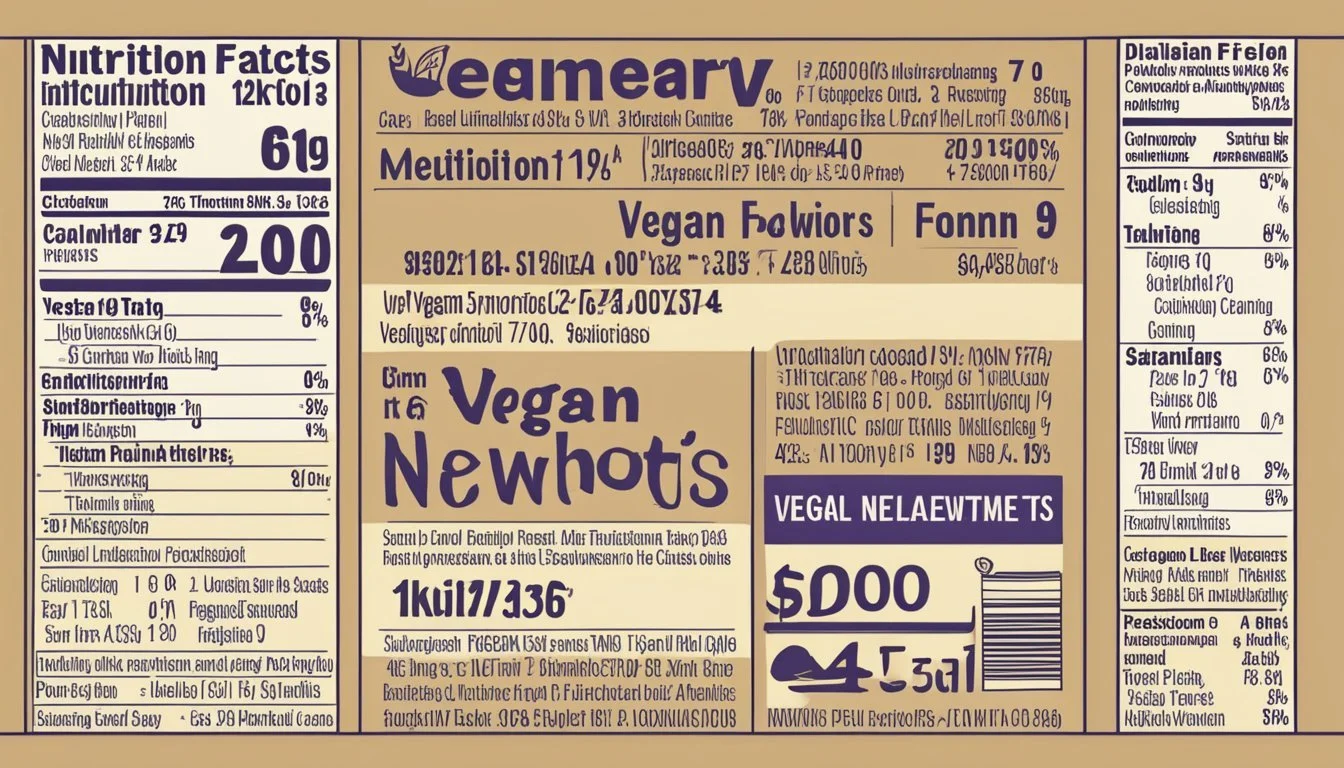Are Fig Newtons Vegan?
Unveiling the Truth About This Classic Cookie
The question of whether Fig Newtons are vegan has garnered attention among those who adhere to a plant-based diet. Originating in the late 19th century, Fig Newtons are a type of cookie with a distinct fig paste filling. Modern scrutiny of the ingredients list by vegans has raised discussions about the snack's compatibility with a vegan lifestyle, which excludes all forms of animal exploitation and cruelty as far as possible, including in the diet.
When assessing if Fig Newtons are vegan, it's essential to understand the ingredients typically used in their production. Traditional Fig Newtons are composed of a soft wheat-based dough and a sweet filling made primarily from figs. While figs and wheat are vegan-friendly, some Fig Newtons may include non-vegan ingredients such as honey, milk derivatives, or certain preservatives derived from animal sources, which brings the vegan status of certain varieties into question.
Furthermore, there's a consideration of the natural process by which figs are pollinated, involving a specific species of wasp. Although a wasp may die in this process, it is generally viewed by the vegan community as a natural occurrence rather than an act of animal exploitation. Consequently, figs are considered vegan. However, it is up to individual vegans to decide if they will include such foods in their diet depending on their perspectives on these nuanced issues.
What Are Fig Newtons?
Fig Newtons are a well-recognized brand of baked goods known for their distinctive square shape and fruit filling. They encompass a blend of ingredients that form a soft dough exterior filled with a sweet fig paste.
History and Brand
The Fig Newton, named after the town of Newton, Massachusetts, was first launched in 1891 by the Kennedy Biscuit Works, which later became part of Nabisco. The snack was distinctive for its unique shape and filling, which was an innovation at a time when most cookies were plain or uniformly filled with a simple cream.
Ingredients Overview
The primary ingredients in Fig Newtons include flour, sugar, figs, and water, forming the two main components: the outer dough and the inner fig paste. The dough typically combines flour, sugar, and other ingredients to create a soft and chewy texture. The fig filling is a fruit paste made from figs and sugar, often enriched with additional fibers and water to adjust consistency.
Component Key Ingredients Outer Dough Flour, Sugar, Water Fig Paste Filling Figs, Sugar, Fiber
These ingredients, while simple, are assembled through a proprietary process to create the characteristic Newtons that are enjoyed by many.
Assessing Vegan Status
When determining if a product is vegan, one examines the ingredients and production process to ensure they align with vegan principles, which exclude all forms of animal exploitation and cruelty.
Defining Vegan Products
A vegan product is one that contains no animal-derived components, including meat, dairy, eggs, honey, and by-products like gelatin or whey. Strict vegan standards also consider the production process, excluding items that involve animal testing or exploitation.
Analyzing Fig Newton Ingredients
Fig Newtons consist primarily of a fig filling wrapped in a pastry dough. The original recipe includes ingredients such as wheat flour, sugar, fig paste, corn syrup, and canola oil. Some variations might have different flavorings or additional components. Plant-based ingredients are those derived from plants, such as fig paste, whereas non-plant-based would include dairy or whey.
Controversial Ingredients in Fig Newtons
Bone char: Often used in refining sugar, it's not present in sugar itself but may affect whether the end product is considered vegan. Natural and artificial flavors: May be derived from plant or animal sources; specific sourcing often isn't disclosed by manufacturers. Palm oil: While plant-based, its use raises ethical concerns due to the impact on wildlife and deforestation.
Ingredient Concern for Vegans Sugar May not be considered vegan if processed with bone char. Natural flavors Source undisclosed; can be animal-derived. Palm oil Plant-based, but controversial due to ethical reasons.
Fig Newton Varieties
At present, Nabisco produces the original Fig Newtons and several other flavors including strawberry, apple, and raspberry. Each flavor variant may contain different ingredients, and thus, its vegan status could vary. For example, some may contain dairy or other non-vegan additives, while vegan Fig Newtons would exclude these ingredients and use plant-based or synthetic alternatives for flavors and texture.
Nutritional Information
In assessing the nutritional profile of Fig Newtons, one considers their calorific value, macronutrient content, and the presence of allergens. The following information lays out these attributes in detail.
Calorific Value
Fig Newtons provide a moderate number of calories, with approximately 100 calories per two-cookie serving. Carbohydrates are the primary source of these calories, contributing to the energy density of the snack.
Protein and Fiber Content
Each serving of Fig Newtons contains 1 gram of protein and 1 gram of dietary fiber. The fiber is partly from the natural figs used in the filling, while the protein is derived from the wheat flour in the cookie crust.
Presence of Allergens
Fig Newtons are made with wheat flour, which contains gluten, a common allergen. Individuals with gluten sensitivity or celiac disease should avoid consuming Fig Newtons. Additionally, the recipe may have cross-contact with other allergens due to shared production facilities.
The nutritional profile also includes 21 grams of carbohydrates, with a significant portion of this being sugars (12 grams of total sugars, 8 grams of which are added sugars). In terms of minerals, they provide about 20 mg of calcium, 6 mg of iron, and 70 mg of potassium per serving. While Fig Newtons do not boast a significant array of vitamins and minerals, they offer a small contribution to daily iron and potassium intake.
Common Concerns
When examining whether Fig Newtons are vegan, one must consider several ingredients and production processes that raise concerns among the vegan community. These include the use of palm oil, the potential presence of bone char processed sugar, and the unique fig pollination process involving wasps.
Use of Palm Oil
Palm oil is often listed among the ingredients in Fig Newtons. While palm oil itself is a plant-based product, its production is associated with significant environmental issues, such as deforestation and habitat destruction for endangered species. These environmental concerns lead some vegans to avoid products containing palm oil.
Presence of Bone Char Processed Sugar
Sugar used in Fig Newtons may be processed with bone char, a decolorizing filter made from animal bones, which is a concern for vegans seeking to avoid all animal by-products. Not all sugar is processed in this way, and it’s important to verify with manufacturers whether their sugar is bone char-free.
Wasp Involvement in Figs Production
The relationship between figs and wasps is a nuanced aspect of veganism. Some varieties of figs are pollinated by wasps, which may end up being absorbed by the fig. Consequently, the presence of these dead wasps in figs has sparked debate among vegans. However, many commercial figs are self-pollinating and do not require wasp intervention. Other ingredients such as natural and artificial flavors or artificial color like Red 40—commonly found in raspberry or blueberry Fig Newtons—may be tested on animals or derived from controversial ingredients, leading some individuals to consider them non-vegan.
Homemade Vegan Fig Newtons
Creating vegan fig newtons offers a delightful twist to the traditional cookie by substituting plant-based ingredients for any animal-derived products. These variations accommodate those following vegan diets without compromising the classic taste and texture.
Vegan Recipe Alternatives
To replicate the iconic fig newton, one can utilize organic dried figs to ensure a natural sweetness free from preservatives like sulfur dioxide. A purée can be made by simmering the figs in water to soften them before blending into a smooth paste. Instead of white sugar, alternatives like date sugar or maple syrup can be used to maintain the recipe's integrity.
The typical filling of fig newtons, sometimes bolstered with corn syrup or invert sugar, can be substituted with a mix of mashed figs and a sugar-free alternative to match personal dietary preferences. Meanwhile, the outer dough—which in commercial fig newtons might contain preservatives such as sodium benzoate or dough conditioners like maltodextrin—can be made with whole grain wheat flour or a gluten-free equivalent for a wholesome homemade version.
Ingredient Substitutions
All-purpose flour: Sift and use in combination with a leavening agent like baking powder to produce light, tender cookie dough.
Ingredient Substitute Vegan butter Coconut oil or applesauce for fat Egg Albumin Flaxseed meal or chia seeds, mixed with water Vanilla Extract Pure extract rather than synthetically flavored Sugar Organic cane, coconut, or date sugar for sweetness Black Mission Figs Any variety of figs that are dried and unsweetened
The inclusion of ingredients such as egg albumin is unnecessary, as plant-based binders like flaxseed or chia seeds create the desired texture. The selection of vegan butter and organic vanilla extract enhances flavor while keeping the recipe dairy-free. It is instrumental to note that organic plant-based ingredients not only enrich the quality but also uphold a commitment to vegan ethics.
Environmental and Ethical Considerations
The production of Fig Newtons, a popular sweet treat with fig paste, brings forth important environmental and ethical issues, particularly in terms of ingredient sourcing and broader environmental impacts.
Sustainable Ingredient Sourcing
When it comes to sustainable ingredient sourcing, the figs and cane sugar used in Fig Newtons should ideally come from farms that practice sustainable agriculture. This means that the cultivation of real figs and cane sugar should not contribute to the destruction of natural ecosystems, such as peatlands or lead to significant deforestation. It's also important that these ingredients are harvested through fair labor practices.
Figs: Grown widely, should come from self-pollinating trees to minimize the ecological impact.
Cane Sugar: Needs to be sourced while maintaining biodiversity and without exploiting labor.
Impact of Palm Oil
Palm Oil is a controversial ingredient found in many food products due to its connection with environmental concerns. It's inclusion in food items like cookie snacks can signal a range of ethical issues:
Deforestation: Palm oil production is a leading cause in the destruction of tropical forests.
Peatland: Development of palm oil plantations often involves draining peatlands, leading to increased greenhouse gas emissions.
In Table Format:
Ingredient Concern Note to Consumers Palm Oil Deforestation Check for sustainable sourcing. Peatland Damage Choose products without palm oil if possible.
Consumers looking for a dairy-free option may find Fig Newtons suitable as they do not contain dairy-based derivatives. This can be beneficial for those adhering to a vegan diet or for anyone concerned about the environmental impact of dairy farming. However, thorough checks for ingredients like palm oil are recommended for those concerned about environmental implications and seeking to enjoy their coffee with a more ethically-produced treat.
Culinary Uses and Pairings
Fig Newtons, especially vegan options, offer versatility in culinary uses and pairings. They provide a balance of sweetness and fruitiness, making them a suitable snack for various occasions and dietary needs.
Serving Suggestions
Fig Newtons, whether vegan or not, can be served in multiple ways to enhance their enjoyment. They are traditionally enjoyed as a snack on their own, which showcases their distinctive fig filling and soft cookie exterior. However, for an elevated experience, they can be:
Paired with coffee: The cookie's sweetness complements the bitter notes of coffee, making a satisfying combination for breakfast or an afternoon pick-me-up.
Crumbled as a topping: Crumbled Fig Newtons add a sweet and textural element to plant-based yogurts or oatmeal.
Integrated into desserts: Use them as a layer in fruit-based parfaits or blend into vegan ice cream for a fruity twist.
Dietary Integration
Vegan Fig Newtons can easily be integrated into various dietary practices, improving the healthfulness of a sweet treat due to their plant-based composition. They are an excellent addition to:
Healthier Dessert Options: As a fruit-filled snack, they can play a part in a healthier dessert choice compared to confectionaries like Starburst, which are higher in processed ingredients.
Vegan Snack Rotation: Ideal for those following a vegan lifestyle, Fig Newtons provide a convenient option that aligns with ethical dietary choices.
Baking: Vegans can incorporate Fig Newtons into homemade baked goods, using parchment paper to line trays for non-stick baking and easier cleanup.
Conclusion
When it comes to determining whether Fig Newtons are compatible with a vegan diet, it is important to closely examine the ingredients. The traditional Fig Newtons may pose concerns for strict vegans due to components like refined sugar, which could be processed with animal bone char, and food dyes that may have been tested on animals.
On the other hand, vegan Fig Newtons have gained popularity, offering a solution for those following a plant-based lifestyle. These vegan options eliminate food dyes, most commonly use plant-based sweeteners, and avoid any animal-derived ingredients.
For individuals with dietary restrictions beyond veganism, such as a gluten-free diet, there are specialty made Fig Newtons that cater to these needs without compromising flavor or texture. These alternatives typically use a combination of gluten-free flours to achieve a similar experience to the original cookie.
It's worth noting that while processed sugars are a concern for some, healthier alternatives include unrefined sugars or natural sweeteners like date paste, which can be found in homemade or artisanal versions of the cookie.
In summary, vegans have the option to savor fig cookies adapted to their dietary preferences. Whether purchasing store-bought vegan Fig Newtons or making them at home, they can enjoy this classic treat by opting for versions that align with ethical and dietary considerations.








